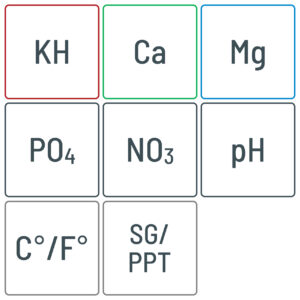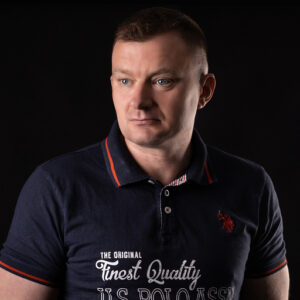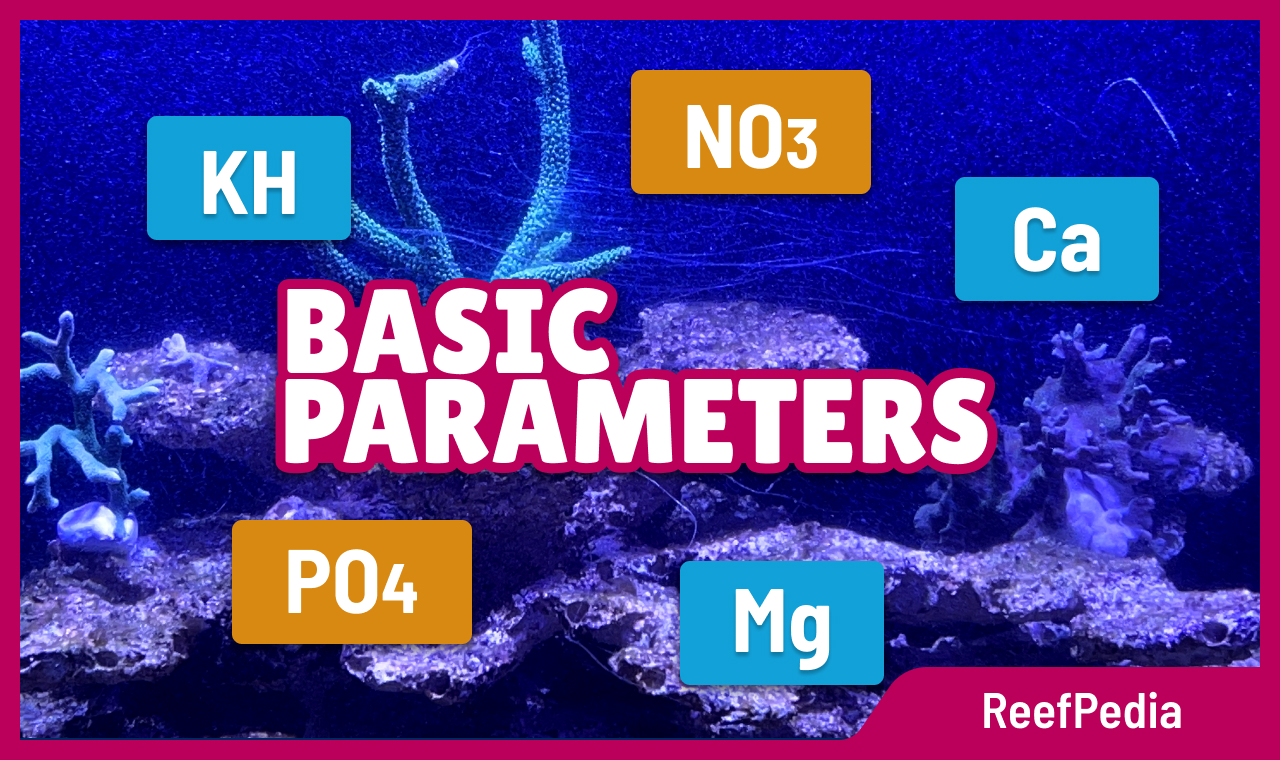In marine aquaristics, we distinguish a certain group of basic parameters. I would like to briefly describe them in this article which is intended for people who are just starting their adventure with marine aquaristics.
What are the basic parameters and what values should be maintained in a marine aquarium?

KH – Carbonate hardness of water
KH is one of the key parameters of sea water. Appropriate carbonate hardness of water in a marine aquarium allows corals to build skeletons and color properly. A stable level of this parameter is extremely important. Some corals, especially corals from the acropora group, do not tolerate KH fluctuations. The parameter changes when hard corals are added to the aquarium, they consume KH by drawing it from the water. Therefore, if we add hard corals to the tank, we must constantly monitor this parameter and if it starts to drop – start dosing.
KH should usually be kept at the level of 7-8 dKh.
Ca – calcium
Calcium is responsible for a number of processes in marine animals and is needed for building their skeletons.
Animals are not very susceptible to its changes, but its content should be kept at the level of 390-440 ppm.
Mg – magnesium
Magnesium is also needed for building skeletons. It participates in the process of calcium absorption in marine animals.
As with calcium, animals are not clearly susceptible to fluctuations in this parameter, but we should try to keep it between 1250 and 1440 ppm.
PO4 – phosphates
One of the parameters indicating whether we have a problem with the purity of the water. It is also necessary for many marine aquarium inhabitants to live.
We keep it in the range of 0.04-0.08 ppm, but if there is such a demand, its value can be higher – it all depends on the requirements of the animals we have in the aquarium.
NO3 – nitrates
The second parameter that determines the purity of water. It’s needed for the life of many marine animals. NO3 is the last parameter in the so-called nitrification cycle, in which ammonia is converted into nitrites and finally into nitrates.
We keep NO3 in the range of 0.5 to 5, although higher levels can also be tolerated.
pH – an indicator of the condition of biology in the aquarium
I described the role of pH in detail.
It’s worth taking a moment to read this article, because pH plays a number of important roles in the tank, and yet it is sometimes a parameter neglected by marine aquarists.
Salinity
Salinity is actually a collection of minerals. They should be kept constant. In general, if you follow the rules of adding RO water and performing water changes correctly, the salinity should not change.
We keep the parameter at the level of 32-35 ppt.
Temperature
The temperature should be constant. Fluctuant temperature means fluctuant salinity, and when salinity changes, along do all other water parameters.
We keep the water temperature at 24-27 °C / 75 – 80 °F
Check out this article to learn how often to test each parameter.
Summary
This short article gives a very general overview of the basic parameters. If you’re serious about setting up a marine aquarium, learning more about it will be crucial to running a successful tank. Each of the parameters has been extensively described on Reefpedia in the Chemistry and Biology section.
As usual, I invite you to talk on Social Reef, where in a dedicated thread we talk about basic water parameters.
About the author

Marek Protasewicz
Reefkeeping has been my passion for over 10 years now. I love learning. The hobby has taught me many valuable lessons, patience being the best example.
Combining work and passion is my path. I run Crazy Coral, a marine aquarium shop, for a number of years. Building this business from the scratch I learnt from my own mistakes at a heavy cost.
Later I managed a project aimed at development of methods for quick growth of Corals in non-natural conditions. The project was carried out by Get Sales, Poland.
Presently, I am responsible for distribution strategy at Reef Factory, of which I am a
co-founder. The company produces smart devices for marine aquaristics.
The last projects I have been involved in are Social Reef and ReefPedia.



